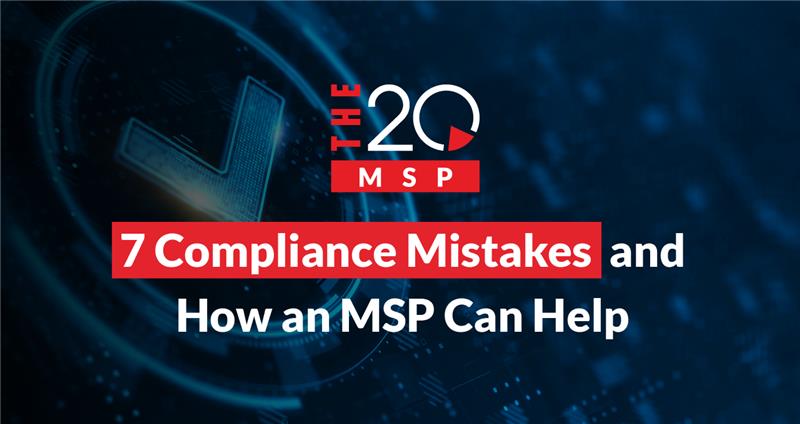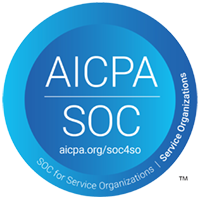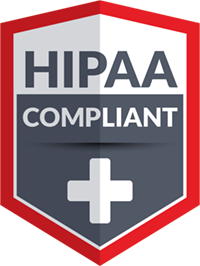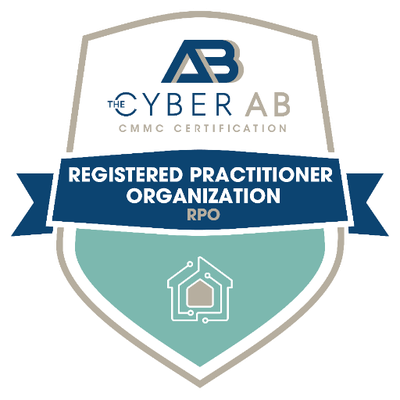
7 Compliance Mistakes and How an MSP Can Help
Compliance regulations aren’t optional. Fall out of compliance, and you risk serious consequences, including data breaches, hefty legal penalties, and reputational damage.
The problem? According to a poll conducted by Ipsos, half of small businesses say compliance requirements are a barrier to growth. Many end up making expensive mistakes just trying to keep up.
So, let’s break down some of those mistakes and how partnering with an MSP can help you avoid them while staying compliant.
1. Unaware = Uncompliant
Compliance regulations are constantly changing, and keeping on top of these changes can be overwhelming for many small businesses. For example, just last year, many financial firms had to adjust to a wave of updated compliance requirements.
Without a way to monitor these changes, it’s easy to miss something critical. And when that happens, you can fall out of compliance without even realizing it – until it’s too late.
How an MSP can help
A good MSP doesn’t just help you achieve compliance, but they also keep you there. An experienced MSP will know what regulatory changes are coming and when, helping you update and adjust your environment as needed.
2. Treating Compliance as a Checkbox
Compliance is not a one-and-done task. It requires ongoing attention beyond potential regulation changes. Even if regulations stay the same, your environment can change.
New tools or changes in employee roles all create potential regulation problems. For example, if an HR employee moves to a remote position, you’ll need to adjust how they access data and how you’ll secure their remote devices.
When you treat compliance like a checkbox, you’re not going to stay compliant for very long.
How an MSP can help
A great MSP keeps a close eye on changes within your business that could impact compliance. Whether it’s a new device or a change in employee roles, they’ll make sure nothing slips through the cracks.
3. Outdated Security Policies
You’re going to need more than some antivirus licenses to stay compliant. Think firewalls, network protection, encryption, endpoint detection, and advanced monitoring. That’s because business attack surfaces (any part of your organization that a hacker could use to get in) are much larger than they used to be. And compliance regulations have adapted to keep up.
Now, you need a strong security plan that takes a layered approach, where each security tool and process reinforces the next. Without this, a single weak link can leave your entire business vulnerable.
How an MSP can help
It should come as no surprise that MSPs specialize in cybersecurity. MSP teams are the vanguards of modern cyber defense, providing their clients with the latest tools and strategies to counter malicious threats. They’ll, help you craft a tailored security plan that best fits your business while satisfying all regulations for your industry.
4. No Backups or Recovery Plan
Losing sensitive data to an outage, a cyberattack, or simple neglect can have serious repercussions, and backups are your first line of defense against losing that data. That’s why many major regulations, like HIPAA and SOX, require companies to have robust backup systems in place.
But backups alone aren’t enough. A recovery plan is the bigger picture. If you don’t have a well-documented, easy-to-follow recovery plan, it shows you’re not prepared for when things go wrong.
How an MPS can help
Many MSPs offer comprehensive backup services, from installing on-site backup devices to off-site cloud backups. MSPs can also regularly test your backups, update, and maintain them to make sure your backups are functioning when needed. In addition, an MSP can help design a perfect disaster recovery plan down to the finest detail.
5. Failing to Properly Train Employees
Employee negligence has long been the leading cause of data breaches. But this typically isn’t the employee’s fault – it’s the business’s responsibility to train its employees in cyber awareness. Without proper training, you can’t expect employees to recognize threats or know how to respond, and it only takes one mistake for things to go south.
How an MSP can help
Many MSPs offer extensive training programs. From interactive phishing simulations to microlearning videos, you can choose the format that works best for your team. These programs often include dashboards that give you a quick overview of your organization’s overall awareness level, along with cyber awareness scores and automated reminders for employees who still need to complete their training.
6. Bad Record Keeping
If you’re compliant, you’ll need to prove it. How’d you do that? With good bookkeeping.
Unfortunately, many companies lose track or become overwhelmed with documenting everything for compliance regulation audits. But documentation isn’t just a “nice to have”; in many industries, it’s a strict requirement. For example, the SEC’s Rule 204-2 requires a firm to maintain accurate and accessible records. In fact, just last year, over 25 financial firms were fined more than $390 million for failing to meet these requirements.
How an MSP can help
A proactive and involved MSP will be intimately familiar with your environment. That means they’re in a unique position to help with record keeping. By maintaining system logs, audit trails, and archiving backups, they can keep your compliance records orderly and accessible.
7. Not Monitoring Software Updates
If there weren’t enough changes already, you can’t forget about software updates. Your computers, apps, and even security tools are constantly getting updates. While many updates improve security, some can accidentally change settings or features that keep you compliant.
However, you can’t just skip these updates because old or outdated software (called legacy apps) often have security holes hackers can exploit. But you shouldn’t just install every update without knowing what it’ll do, especially if it could affect your systems or compliance requirements.
How an MSP can help
It’s a lot to expect a small business to double-check every single update – and it’s often just not possible. Fortunately, MSPs are built for this kind of thing. A good MSP will research and test updates before they hit your systems. If something in an update could cause a problem, they’ll catch it first, make adjustments, and only roll it out when it’s safe.
You’ll get the best of both worlds: software that’s kept up-to-date, with a watchful eye on potential problematic changes.
MSPs Make Compliance Easy
There are no shortcuts with compliance. But that doesn’t mean staying compliant has to be a constant headache.
By teaming up with an MSP, you share the load with experts who truly understand these rules and challenges. At The 20 MSP, we’ve been helping our clients stay compliant for years, while constantly updating our certifications ourselves. Recently, we just got our SOC 2 Type 2 certification – proof that we walk the walk.
If you’re looking for a trusted partner to help keep your business compliant, let’s chat.
Want more tips like this?
Subscribe using the form on the right and get our latest cybersecurity insights delivered straight to your inbox.
About The 20 MSP
As a leading provider of managed IT services, The 20 MSP serves thousands of businesses nationwide, including single and multi-location organizations, delivering white-glove service, secure and streamlined IT infrastructure, and 24/7/365 support. We believe in building lasting relationships with clients founded on trust, communication, and the delivery of high-value services for a fair and predictable price. Our client’s success is our success, and we are committed to helping each and every organization we serve leverage technology to secure a competitive advantage and achieve new growth.




